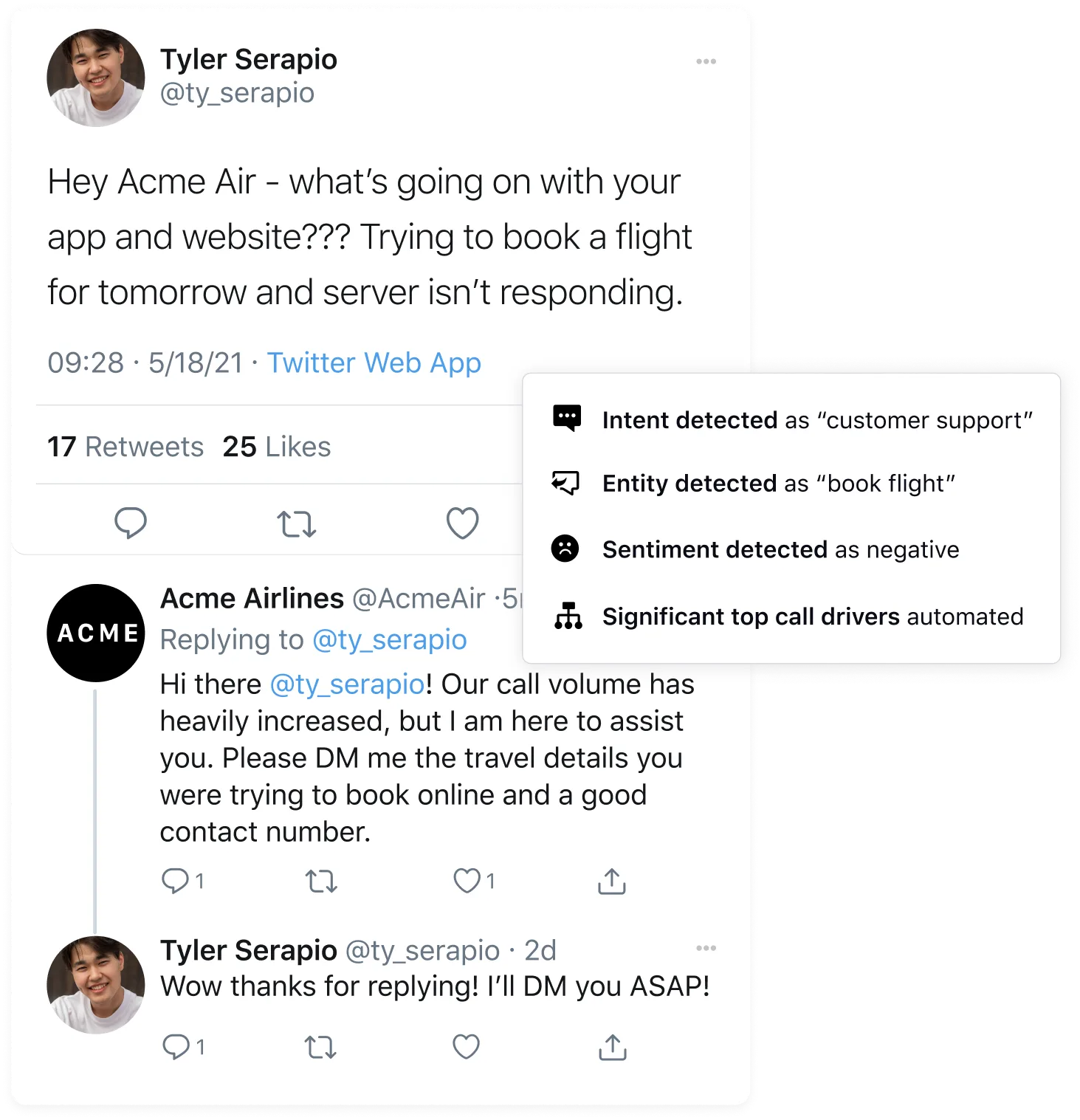- What is conversational intelligence?
- Why is conversational intelligence important?
- Conversational intelligence vs. call tracking software
- Who can benefit from using conversational intelligence?
- Key features of conversational intelligence platforms
- What types of data can conversational intelligence analyze?
- How do businesses use conversational intelligence: An inspiring example?
What is conversational intelligence?
Conversational intelligence is an approach that leverages artificial intelligence(AI) to analyze vast data of speech or text from customer conversations to derive useful insights from them.
Data pulled from call recordings and chat transcripts is organized on contact center CRMs and digital experience platforms to give a detailed picture of the customer sentiment and intent in every conversation. It helps customer support teams deliver personalized support experiences.
Why is conversational intelligence important?
Imagine you're having a conversation with a friend, and you pay close attention to what they're saying, their tone of voice and their emotions. You're not just hearing their words; you're understanding the deeper meaning behind their sentences and how they feel. This is exactly what businesses can do with conversational intelligence. It can turn them into great listeners for their customers and it can lead to the following benefits.
Insightful customer understanding
Conversational intelligence allows businesses to delve deeply into customer interactions, helping them grasp customers' unique preferences, pain points and behaviors. This knowledge empowers organizations to tailor their services and support to meet individual customer needs effectively.
Prompt issue resolution
By harnessing conversational intelligence tools, customer service teams can promptly identify and address customer queries and concerns in real-time. This agility leads to quicker issue resolution, which in turn enhances overall customer satisfaction. Also, providing customers with timely and relevant information during their buying process or renewal journey can lead to increased sales and revenue. Read more: 5 ways to improve customer response time with AIPersonalized experiences
Personalized experiences foster customer loyalty and retention, increasing customer lifetime value. Through the analysis of past conversations, companies can create highly personalized customer experiences. Hyper-personalization involves recognizing individual preferences, purchase histories and even emotional states, enabling customer service representatives to provide customized recommendations and solutions.Cost efficiency
Efficient utilization of conversational intelligence can result in cost savings within customer service operations. Improving agent efficiency and implementing customer self-service can significantly cut operational costs. By automating routine tasks and equipping agents with the necessary information, companies can handle a higher volume of customer inquiries while optimizing resource allocation.
Learn more: How your contact center can leverage AI to improve agent productivityCustomer retention
Satisfied and delighted customers are more likely to remain loyal to a brand. Conversational intelligence assists businesses in pinpointing areas for enhancement within customer service, effectively reducing churn and elevating customer retention rates.
Conversational intelligence vs. call tracking software
Call tracking software is a technology solution that enables businesses to monitor, record, and analyze phone calls made to their organization. It helps in identifying the source of calls, assessing the performance of marketing campaigns and enhancing customer service by providing valuable data and insights.
Conversational intelligence and call-tracking software serve different purposes and focus on distinct aspects of communication and data analysis. Conversational intelligence revolves around understanding and improving human interactions, while call tracking software primarily monitors and analyzes phone calls for various purposes, including sales analytics and contact center compliance.
Here is a table explaining the differences in brief.
Aspect | Conversational intelligence | Call tracking software |
Purpose | Enhances human interactions | Monitors and analyzes phone calls |
Functionality | Analyzes spoken or written language | Records and tracks phone calls |
Data source | Conversations, messages, emails, etc. | Phone calls, call recordings |
Analysis depth | Understands context and sentiment | Focuses on call metrics and data |
Key features | Natural language processing | Call recording, call duration, etc. |
Use cases | Customer support, sales, marketing | Sales analytics, compliance, etc. |
Insights | Provides actionable insights | Generates call reports and statistics |
Who can benefit from using conversational intelligence?
Conversational intelligence can provide benefits to several teams within a business, that includes :
Customer service teams
Customer service teams can use conversational intelligence to enhance their interactions with customers, leading to improved issue resolution, increased customer satisfaction and more efficient support operations.Sales
Sales teams can leverage conversational intelligence to gain insights into customer preferences and objections, helping them tailor their sales strategies for higher conversion rates and better customer engagement.Marketing
Marketing teams can use conversational data to assess the effectiveness of advertising campaigns, identify high-performing keywords or messaging and make data-driven decisions to optimize their marketing efforts. Learn more: Identify your customer’s buying intent by leveraging AIProduct development
Conversational intelligence can provide valuable customer feedback and insights into product or service improvements, helping product development teams prioritize features and enhancements.Quality assurance and compliance
These teams can use conversational intelligence to ensure that agents adhere to quality standards and compliance regulations in customer interactions.Training and coaching
Conversational intelligence aids in agent training and coaching by identifying areas where agents can improve their communication skills and providing specific feedback.Management and leadership
Senior management can gain a holistic view of customer interactions and use conversational intelligence to make strategic decisions, allocate resources effectively and set performance benchmarks. In essence, conversational intelligence has broad applications across different business functions, enabling teams to make data-driven decisions, improve processes and ultimately deliver better experiences to both customers and employees.
Key features of conversational intelligence platforms
Conversational intelligence platforms are designed to analyze and extract valuable insights from customer interactions, whether they occur through voice calls, chat, email or other communication channels. Here are some key features typically found in conversational intelligence platforms:
Speech-to-text conversion: Conversational intelligence platforms can convert audio recordings of customer calls into text format, making it easier to analyze and search for specific keywords or phrases.
Learn more: Understand the A-Z of speech analyticsNatural language processing (NLP): NLP capabilities allow these platforms to understand the context and sentiment behind customer conversations. This helps in identifying customer emotions, intentions and issues.
Sentiment analysis: Sentiment analysis gauges the emotional tone of customer interactions. This enables businesses to identify positive and negative sentiments, helping them gauge customer satisfaction and detect potential issues.
Keyword and phrase analysis: These platforms can identify and highlight specific keywords, phrases or topics that are frequently mentioned in customer conversations. This is useful for identifying trends, common customer issues or emerging topics of interest.
Conversation categorization: Conversational intelligence platforms categorize customer interactions into different topics or themes, making it easier to track and analyze patterns and trends over time.
Customer journey mapping: Some conversational intelligence platforms allow businesses to map out the entire customer journey by analyzing conversations at different touchpoints. This helps in understanding the end-to-end customer experience.
Automated alerts: Platforms can generate automated alerts for specific events or keywords. For example, they can flag instances of customer dissatisfaction or potential sales opportunities for immediate action.
What types of data can conversational intelligence analyze?
Conversational intelligence can analyze a wide array of data types from customer interactions:
📜Textual data
This includes the actual text of written conversations, like chat logs, email exchanges, or social media messages. It helps in understanding customer queries, concerns and sentiments.
📞Speech data
For phone calls or voice interactions, conversational intelligence can transcribe and analyze spoken words, allowing businesses to gain insights from verbal conversations.
😀Tone and emotion
It can detect the emotional tone of conversations, helping assess customer satisfaction, frustration or enthusiasm based on vocal cues or written expressions. Learn more: A detailed guide on voice analytics
🔜Keywords and phrases
Analyzing keywords and recurring phrases can identify common topics, frequently asked questions and key issues that customers frequently bring up.
⛅Demographic information
Conversational data may reveal demographic insights about customers, such as their age, gender, location or profession, helping with customer segmentation.
How do businesses use conversational intelligence: An inspiring example?
Cdiscount, a prominent French e-commerce company, faced a massive influx of customer inquiries—almost four million calls, 300,000 social media conversations, and countless messages between customers and sellers annually.
The challenge: Gain insights from these interactions to enhance the customer experience. Traditional analysis methods couldn't handle the scale and variety of communication channels. They needed to understand customer sentiments, identify satisfaction drivers and improve agent training.
The solution: Cdiscount adopted Sprinklr Service, which transformed their customer relations. This solution enabled them to analyze customer interactions from various channels and acted on insights to boost customer relationships and the overall experience. Utilizing Sprinklr AI, they were able to:
Transcribe and analyze voice, chat and social interactions.
Pinpoint crucial conversation themes like delivery issues and refunds.
Extract reports on trends in customer conversations and satisfaction drivers.
The result: Real-time insights fueled continuous customer support improvement, and alerts were set up for sensitive issues. Sprinklr AI also helped detect anomalies, identifying and resolving a payment bug that impacted 12,000 customers in just hours.
With Sprinklr Service, Cdiscount now analyzes 100% of customer support calls and over 75,000 conversations. Agents receive quality and CSAT scores for interactions, with CSAT scores increasing by 15%.
This has significantly improved the quality of agent-customer interactions. The company's goal is to integrate all contact channels into the Sprinklr platform to further enhance agent training and customer experiences.
Read the full story here.
If you want to replicate Cdiscount’s success and scale up conversational intelligence, request a demo of Sprinklr Service and discover how it can help you.
Frequently Asked Questions
Conversation intelligence refers to the assessment and analysis of human-to-human conversations, focusing on factors like communication skills, empathy and effectiveness.
Conversational intelligence pertains to AI-driven systems that can understand, process and respond to natural language in conversations, such as chatbots or virtual agents. The former relates to human interactions, while the latter involves AI technologies.
related products
Thank you for contacting us.
A Sprinklr representative will be in touch with you shortly.
Contact us today, and we'll create a customized proposal that addresses your unique business needs.
Request a Demo
Welcome Back,
No need to fill out any forms — you're all set.




